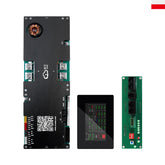Sollte ich meine Wohnmobilbatterie trennen, wenn sie angeschlossen ist?
Wenn Sie im Wohnmobil unterwegs sind oder Ihr Wohnmobil einfach für Wochenendausflüge nutzen, ist eine der häufigsten Fragen von Wohnmobilbesitzern: „Soll ich meine Wohnmobilbatterie abklemmen, wenn sie angeschlossen ist?“ Ob erfahrener Wohnmobilbesitzer oder Anfänger, das Verständnis der Batteriewartung ist entscheidend für die Langlebigkeit und Zuverlässigkeit Ihres Wohnmobils. In diesem Artikel erfahren Sie, wie wichtig es ist, die Wohnmobilbatterie abzuklemmen, wann dies getan werden sollte und welche möglichen Folgen es hat, wenn sie angeschlossen bleibt.
- Warum sollten Sie die Batterie Ihres Wohnmobils abklemmen?
- Trennen Sie den Akku während der Langzeitlagerung
- Sollten Sie Ihre Wohnmobilbatterie vom Stromnetz trennen, wenn sie an ein Solarpanel angeschlossen ist?
- Was passiert, wenn Sie die Batterie nicht abklemmen?
- So trennen Sie Ihre Wohnmobilbatterie ordnungsgemäß
Das Abklemmen der Batterie Ihres Wohnmobils, wenn es an eine Stromquelle angeschlossen ist, ist oft ein wichtiger Schritt zur Erhaltung der allgemeinen Funktionsfähigkeit Ihres elektrischen Systems. Die Antwort auf diese Frage ist jedoch nicht so einfach, wie Sie vielleicht denken. Es gibt verschiedene Faktoren zu berücksichtigen, wie z. B. den Typ Ihrer Wohnmobilbatterie, die Art der angeschlossenen Stromquelle und die Häufigkeit der Nutzung Ihres Wohnmobils. Wir gehen im Folgenden näher darauf ein, um Ihnen eine fundierte Entscheidung zu ermöglichen.
Warum sollten Sie die Batterie Ihres Wohnmobils abklemmen?
Wenn Sie an Landstrom angeschlossen sind oder Ihr Wohnmobil an eine Stromquelle angeschlossen ist, hält das Ladegerät des Wohnmobils die Batterie normalerweise geladen. Die Batterie jedoch ständig angeschlossen zu lassen, ist möglicherweise nicht die beste Idee für ihre Lebensdauer. Tatsächlich ist es eine gängige Praxis bei der Wohnmobilwartung, die Batterie bei Nichtgebrauch abzuklemmen, insbesondere wenn Sie Ihr Wohnmobil für längere Zeit einlagern.
Überladung verhindern
Das Abklemmen der Wohnmobilbatterie ist unerlässlich, um eine Überladung zu vermeiden, insbesondere wenn sie an eine Stromquelle ohne geeigneten Laderegler angeschlossen ist. Eine überladene Batterie kann überhitzen, wodurch die internen Komponenten beschädigt werden. Überladung führt außerdem zum Verlust von Batterieflüssigkeit, was die Leistung der Batterie drastisch reduzieren kann. In diesem Fall ist das Abklemmen der Batterie eine effektive Möglichkeit, den Zustand Ihrer Batterie zu erhalten.
Vermeidung von Stromverlust
Ein weiterer Grund, die Batterie abzuklemmen, ist die Vermeidung unnötiger Entladung. Selbst wenn Sie Ihr Wohnmobil nicht benutzen, können bestimmte Systeme im Fahrzeug – wie Kühlschrank, Alarmanlage oder andere elektronische Geräte – Strom aus der Batterie ziehen. Wenn die Batterie ständig an die Stromquelle angeschlossen ist, können sich diese kleinen Entladungen summieren und die Batterie schließlich entladen, sodass Sie gerade dann eine leere Batterie haben, wenn Sie sie am meisten brauchen. Das Abklemmen der Batterie, wenn Sie das Wohnmobil nicht benutzen, hilft, ihre Ladung zu erhalten.
Trennen Sie den Akku während der Langzeitlagerung
Wenn Sie Ihr Wohnmobil über den Winter oder für einen längeren Zeitraum einlagern, ist es wichtig, die Wohnmobilbatterie vom Stromnetz zu trennen. Längerer Anschluss an Stromquellen ohne ordnungsgemäße Überwachung kann die Ladefähigkeit der Batterie beeinträchtigen. Aus diesen Gründen ist das Trennen der Batterie während der Lagerung wichtig:
Temperaturregelung
Wohnmobile sind in vielen Klimazonen unterschiedlichen Temperaturen ausgesetzt, und extreme Kälte kann die Batterieleistung beeinträchtigen. Kälte kann dazu führen, dass der Elektrolyt in der Batterie gefriert und irreversible Schäden verursacht. Indem Sie die Batterie während der Lagerung vom Stromnetz trennen, verringern Sie das Risiko dafür. Manche Wohnmobilbesitzer entscheiden sich außerdem dafür, die Batterie komplett auszubauen und sie in einem klimatisierten Raum zu lagern, um sie zusätzlich zu schützen.
Verlängerung der Batterielebensdauer
Indem Sie Ihre Wohnmobilbatterie bei Inaktivität vom Stromnetz trennen, verlängern Sie deren Lebensdauer. Mit der Zeit kann eine Batterie, die ständig angeschlossen bleibt und sich entlädt, ihre Ladung verlieren. Das Trennen der Batterie, insbesondere außerhalb der Saison, stellt sicher, dass sie voll geladen und bei Bedarf einsatzbereit bleibt.
Sollten Sie Ihre Wohnmobilbatterie vom Stromnetz trennen, wenn sie an ein Solarpanel angeschlossen ist?
Während das Abklemmen der Batterie in vielen Fällen eine gute Praxis ist, können Solarmodule das Laden Ihrer Wohnmobilbatterie entscheidend verbessern. Wenn Sie eine Solaranlage auf Ihrem Wohnmobil installiert haben, gestaltet sich die Situation komplexer.
Vorteile der Nutzung von Solarenergie
Wenn Sie an ein Solarpanel angeschlossen sind, wird Ihre Wohnmobilbatterie ständig durch Sonnenenergie geladen, sodass Sie keinen Landstromanschluss oder Generator benötigen. Das bedeutet, dass Sie die Batterie nicht unbedingt vom Stromnetz trennen müssen, da das Solarsystem die Ladung der Batterie verwaltet und eine Überladung verhindert.
Überwachung des Batterieladezustands
Auch mit einer Solaranlage ist es wichtig, den Ladezustand Ihrer Batterie regelmäßig zu überwachen. Einige Solaranlagen für Wohnmobile verfügen über integrierte Laderegler, die den Stromfluss zur Batterie regulieren und so eine Überladung verhindern. Wenn Sie sich über die Funktionalität Ihrer Anlage nicht sicher sind, empfiehlt es sich dennoch, die Batterie gelegentlich vom System zu trennen, um ihren Zustand zu überprüfen und sicherzustellen, dass alles ordnungsgemäß funktioniert.
Was passiert, wenn Sie die Batterie nicht abklemmen?
Wenn Sie Ihre Wohnmobilbatterie längere Zeit an eine Stromquelle angeschlossen lassen, insbesondere wenn sie nicht verwendet wird, kann dies zu verschiedenen Problemen führen. Im Folgenden sind einige der häufigsten Folgen aufgeführt, wenn Sie die Wohnmobilbatterie nicht vom Stromnetz trennen.
Beschädigung der Batterie
Wenn Ihre Batterie zu lange angeschlossen bleibt, besteht die Gefahr, dass die Zellen im Inneren beschädigt werden. Ständiges Über- oder Unterladen kann dazu führen, dass die Batterie an Kapazität verliert, was bedeutet, dass sie die Ladung nicht mehr so effektiv hält. Das kann dazu führen, dass Sie mit einer leeren Batterie dastehen, wenn Sie wieder auf die Straße wollen.
Potentielle Brandgefahren
In extremen Fällen kann unsachgemäßes Laden und Nichtabklemmen der Batterie sogar zu Überhitzung und damit zu Brandgefahr führen. Dies ist zwar selten, stellt aber ein ernstes Sicherheitsrisiko dar. Um dieses Risiko zu verringern, sollten Sie Ihre Batterie immer abklemmen, wenn sie längere Zeit nicht benutzt wird.
Reduzierte Lebensdauer
Einer der größten Nachteile, wenn Sie Ihre Wohnmobilbatterie ständig angeschlossen lassen, ist die verkürzte Lebensdauer. Wie jede andere Batterie auch, verschleißen Wohnmobilbatterien mit der Zeit. Wenn sie ständig an eine Stromquelle angeschlossen sind und keine ordnungsgemäße Laderegelung vorliegt, verringert sich ihre Kapazität, eine Ladung zu halten. Trennen Sie Ihre Wohnmobilbatterie bei Nichtgebrauch vom Stromnetz, um diesem natürlichen Verschleiß vorzubeugen und so den größtmöglichen Nutzen aus Ihrer Investition zu ziehen.
So trennen Sie Ihre Wohnmobilbatterie ordnungsgemäß
Das Abklemmen der Wohnmobilbatterie mag einfach erscheinen, aber es gibt ein paar Dinge, die Sie beachten müssen, um es richtig zu machen. Hier ist eine Schritt-für-Schritt-Anleitung:
Schritt 1: Alle elektrischen Systeme ausschalten
Stellen Sie vor dem Abklemmen der Batterie sicher, dass alle elektrischen Systeme im Wohnmobil ausgeschaltet sind. Dazu gehören Lichter, Haushaltsgeräte und alle anderen Geräte, die möglicherweise Strom aus der Batterie beziehen.
Schritt 2: Suchen Sie den Batterietrennschalter
Viele Wohnmobile sind mit einem Batterietrennschalter ausgestattet, der das Abklemmen der Batterie erleichtert, ohne Kabel entfernen zu müssen. Suchen Sie einfach den Schalter (normalerweise in der Nähe des Batteriefachs) und drehen Sie ihn in die Position „Aus“.
Schritt 3: Trennen Sie die Batteriekabel
Wenn Ihr Wohnmobil keinen Trennschalter hat, müssen Sie die Batteriekabel manuell trennen. Entfernen Sie zuerst das Minuskabel (schwarz) und dann das Pluskabel (rot). Trennen Sie immer zuerst das Minuskabel, um versehentliche Kurzschlüsse zu vermeiden.
Schritt 4: Bewahren Sie die Batterie sicher auf
Wenn Sie die Batterie längere Zeit lagern, sollten Sie sie aus dem Wohnmobil ausbauen und an einem kühlen, trockenen Ort aufbewahren. Achten Sie darauf, dass die Batteriepole sauber sind und die Batterie auf einer nichtleitenden Oberfläche liegt.
Sollten Sie Ihre Wohnmobilbatterie abklemmen, wenn sie angeschlossen ist? Die Antwort hängt weitgehend von der Stromversorgung Ihres Wohnmobils und der Häufigkeit Ihrer Nutzung ab. In den meisten Fällen ist das Abklemmen der Wohnmobilbatterie bei Nichtgebrauch eine einfache und effektive Möglichkeit, Schäden zu vermeiden, die Batterielebensdauer zu verlängern und unnötigen Stromverbrauch zu vermeiden. Egal, ob Sie Ihr Wohnmobil über den Winter einlagern, vom Landstrom trennen oder eine Solaranlage nutzen – die richtige Batteriewartung ist unerlässlich, um Ihr Wohnmobil in Topform zu halten.
Wie immer ist es wichtig, die Besonderheiten des Batteriesystems und der Ladeeinrichtung Ihres Wohnmobils zu überprüfen. Bei einigen Wohnmobilen, insbesondere solchen mit modernen Solar- oder Generatorsystemen, ist ein Abklemmen der Batterie nicht erforderlich. Regelmäßige Überwachung und Wartung sind jedoch unerlässlich. Mit diesen einfachen Schritten sorgen Sie dafür, dass Ihre Wohnmobilbatterie länger hält, eine bessere Leistung bringt und Ihnen mehr Abenteuer auf der Straße beschert.
Bevor Sie Ihr Wohnmobil wochen- oder monatelang am Stromnetz lassen, sollten Sie die Batterie abklemmen, wenn Sie sie nicht aktiv nutzen. Diese kleine Maßnahme kann wesentlich dazu beitragen, die Leistung Ihrer Batterie zu erhalten und sicherzustellen, dass Ihr Wohnmobil fahrbereit ist, wenn Sie es sind.
Das Abklemmen der Wohnmobilbatterie ist mehr als nur eine einfache Routine – es ist eine Möglichkeit, die allgemeine Funktionsfähigkeit Ihres elektrischen Systems zu erhalten und sicherzustellen, dass Ihr Wohnmobil für Ihr nächstes Abenteuer bereit bleibt.

























Leave a comment
All blog comments are checked prior to publishing